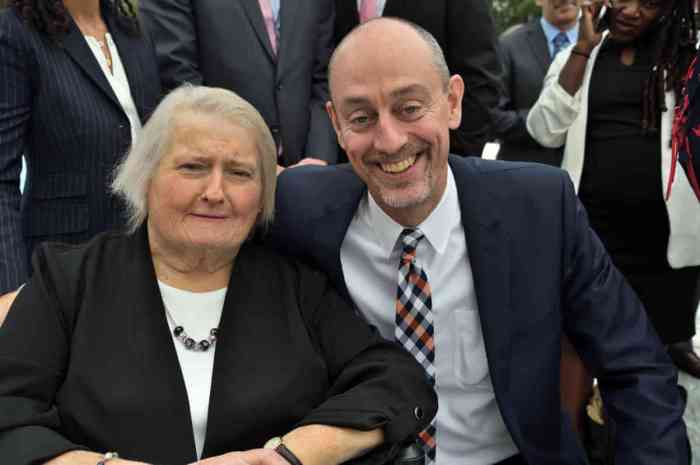James Obergefell, the named plaintiff in the June 26 marriage equality victory. | DONNA ACETO
BREAKING BY PAUL SCHINDLER | The United States Supreme Court, in a 5-4 ruling on June 26, declared that gay and lesbian couples have a federal constitutional right to marry.
In an opinion authored by Justice Anthony Kennedy, the court held that 14th Amendment of the US Constitution requires states to license a marriage between two people of the same sex and to recognize valid same-sex marriages from other jurisdictions.
Kennedy cited the “unjustified infringement of the fundamental right to marry” caused by existing bans on same-sex marriage. He does not spell out a specific level of judicial scrutiny to which marriage bans were held, so the court does not appear to have established a clear standard for reviewing future gay rights claims.
“It is now clear that the challenged laws burden the liberty of same-sex couples, and it must be further acknowledged that they abridge central precepts of equality,” Kennedy wrote. “Especially against a long history of disapproval of their relationships, this denial to same-sex couples of the right to marry works a grave and continuing harm.”
In the conclusion to his opinion, Kennedy wrote, “No union is more profound than marriage, for it embodies the highest ideals of love, fidelity, devotion, sacrifice, and family… [The marriage plaintiffs] ask for equal dignity in the eyes of the law. The Constitution grants them that right.”
The court was ruling in an appeal of a November decision by the Cincinnati-based Sixth Circuit Court of Appeals ruling from November that struck down district court marriage equality victories in Ohio, Michigan, Tennessee, and Kentucky.
The named plaintiff in the appeal was James Obergefell, who had filed suit in Ohio to have the death certificate of his late husband, John Arthur, notated to reflect that he was married. The two men had traveled to Maryland in 2013 to get married, several months before Arthur succumbed to Lou Gehrig's disease. Federal District Court Judge Timothy S. Black in Cincinnati ruled that Ohio must recognize the men’s out-of-state marriage, despite its 2004 ban on marriage by same-sex couples.
Obergefell’s victory –– along with those of other plaintiffs in Ohio and the other three states in a variety of cases –– was struck down by the Sixth Circuit.
The Supreme Court’s action was widely anticipated in light of the fact that since October the high court had declined to stay appellate victories in marriage equality cases in the Richmond-based Fourth Circuit, the Chicago-based Seventh Circuit, and the Denver-based 10th Circuit, as well as a number of district court victories. As a result, the number of marriage equality states had mushroomed since then from 19 to 37, representing nearly 70 percent of the US population.
All four of the justices in the minority wrote dissenting opinions.
In his dissent, Chief Justice John Roberts acidly wrote of those on the winning side of the ruling, “Celebrate the achievement of a desired goal. Celebrate the opportunity for a new expression of commitment to a partner. Celebrate the availability of new benefits. But do not celebrate the Constitution. It had nothing to do with it.”
Roberts' bitterness, however, was –– unsurprisingly –– outdone by that of Justice Antonin Scalia, who fired at Kennedy with the following tirade, “If, even as the price to be paid for a fifth vote, I ever joined an opinion for the Court that began: ‘The Constitution promises liberty to all within its reach, a liberty that includes certain specific rights that allow persons, within a lawful realm, to define and express their identity,’ I would hide my head in a bag. The Supreme Court of the United States has descended from the disciplined legal reasoning of John Marshall and Joseph Story to the mystical aphorisms of the fortune cookie.”
It is noteworthy that Kennedy wrote the majority opinion in four of the major gay rights victories –– overturning an anti-gay Colorado ballot initiative in 1996, striking down sodomy laws nationwide in 2003, throwing out the Defense of Marriage Act in 2013, and now ruling for marriage equality. Roberts wrote the 2013 opinion in which the court declined to hear an appeal of a lower court ruling striking down California's Proposition 8. That action by the high court led marriage equality to resume in the nation's most populous state.
Gay City News will be following up throughout the day with analysis, comment, and reaction.


































